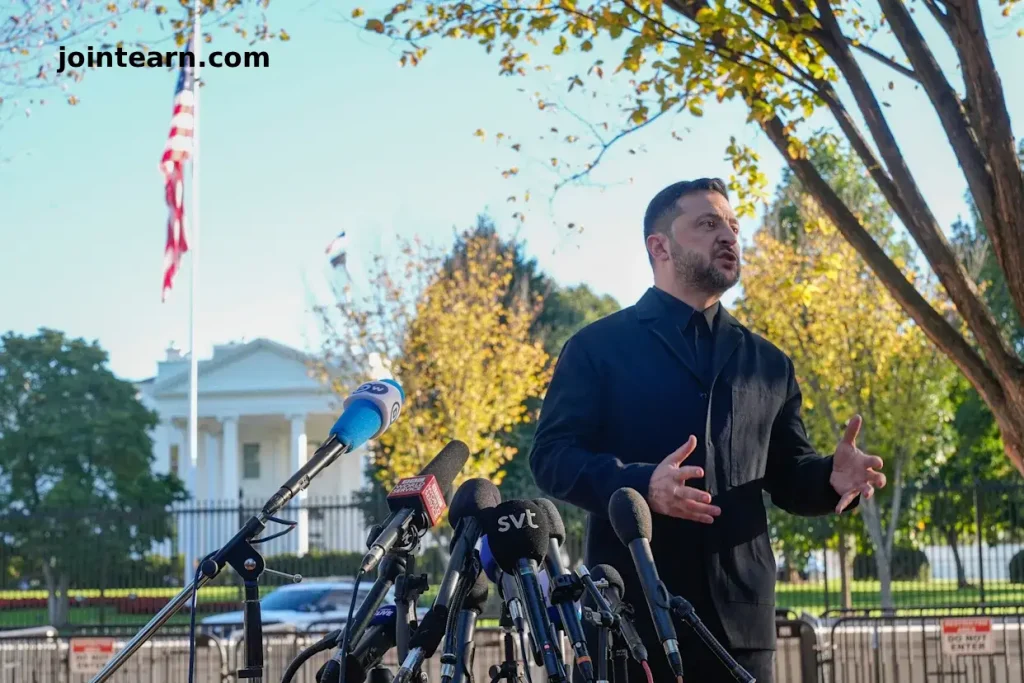
Ukraine and European Leaders Stand Firm Against Land Concessions
Kyiv / Brussels – Ukrainian President Volodymyr Zelenskyy and European Union leaders on Tuesday firmly rejected any proposal to cede Ukrainian territory to Russia as part of peace negotiations, accusing Russian President Vladimir Putin of stalling diplomatic efforts to end the ongoing war.
The statement from eight European heads of state, alongside senior EU officials, emphasized their commitment to the principle that international borders must not be changed by force. The leaders also expressed support for ongoing U.S.-led peace initiatives, including those by President Donald Trump, who is scheduled to meet Putin in Budapest, Hungary in the coming weeks.
“We strongly support President Trump’s position that the fighting should stop immediately, and that the current line of contact should be the starting point of negotiations,” the joint statement read. “We can all see that Putin continues to choose violence and destruction.”
Frozen Russian Assets to Aid Ukraine
In a show of financial and diplomatic backing, EU leaders confirmed their intention to leverage Russia’s frozen assets abroad—amounting to billions of euros—to bolster Ukraine’s war effort. While the move has sparked some legal and political debate, Kyiv and Brussels argue it is necessary to strengthen Ukraine’s defensive capabilities and deter further Russian aggression.
The conflict, now in its fourth year, has left Russia occupying nearly one-fifth of Ukraine’s territory, with the industrial Donbas region at the heart of ongoing disputes. Kyiv officials warn that conceding land could create long-term security risks, providing Moscow with springboards for renewed military attacks.
Trump’s Diplomatic Position Shifts
President Trump’s engagement in Ukraine has been inconsistent. Last month, he reversed a long-held position, suggesting Ukraine could potentially regain all lost territory. However, after recent discussions with Putin and a meeting with Zelenskyy, Trump shifted again, calling for both sides to “stop where they are.”
On Sunday, Trump controversially proposed that the Donbas region be partitioned, leaving most under Russian control. On Monday, he expressed skepticism about Ukraine’s ability to fully defeat Russia, raising concerns among European and Ukrainian officials about the direction of U.S. diplomacy.
Ukraine’s Diplomatic Efforts Intensify
Zelenskyy described this week as “very active in diplomacy,” with the Ukrainian government and European partners striving to keep Trump aligned with their position of no territorial concessions. The coalition of supportive nations, known as the Coalition of the Willing, which includes 35 countries backing Ukraine, will meet in London on Friday to discuss the war effort and further diplomatic strategies.
Meanwhile, EU leaders are preparing for an upcoming summit in Brussels on Thursday to consider additional economic sanctions against Russia, aimed at exerting more pressure on Putin’s military and industrial capacity until he engages seriously in peace negotiations.
“We must ramp up the pressure on Russia’s economy and its defense industry, until Putin is ready to make peace,” the joint statement said.
Security and Future Risks
European and Ukrainian officials warn that a conflict frozen along current front lines could fester, leaving occupied areas vulnerable to further attacks. Maintaining Ukraine’s territorial integrity is considered essential not only for national security but for the broader principle of international law and border sovereignty.
The current diplomatic push underscores the complex interplay between military strategy, economic sanctions, and high-level negotiations, as Kyiv and its allies work to prevent any compromise that could legitimize Russia’s territorial gains.


Leave a Reply